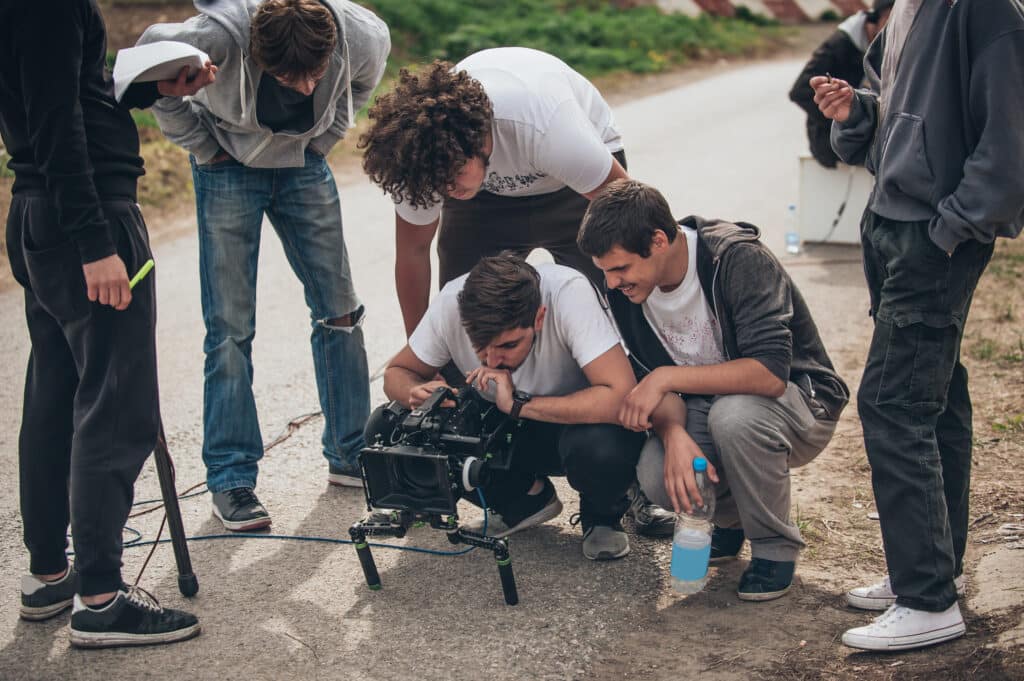If you are planning an audiovisual production in Spain, one of the most important steps is hiring a film crew. The country has highly qualified professionals and a constantly growing industry. In this article, we will guide you through the key steps to hire your crew to shoot in Spain, helping you find the best professionals and informing you about the specifics of contracts, salaries, and regulations.
Where to find qualified crew
Finding the right professionals and services for your project is fundamental to success. Fortunately, Spain offers multiple avenues to access a vast pool of local film talent.
International platforms and databases
There are numerous online platforms that allow you to connect with freelance filmmakers in Spain. Sites like Mandy, Production Hub, or The Dots are excellent resources. These databases typically include detailed profiles, portfolios, and contact information for professionals in various specialties, making it easier to find specific talents.
Regional film offices and local directories
Regional Film Commissions and Film Offices are invaluable resources. For example, the Madrid Film Office or the Andalucía Film Commission maintain up-to-date directories of film technicians and local service companies in Spain. Contacting these offices ensures access to professionals familiar with the local environment and industry.
Industry networking events and unions
Attending film festivals like those in San Sebastián or Málaga is an excellent way to meet production staff and establish contacts in Spain. Additionally, unions and professional associations, such as the Spanish Association of Directors of Photography (AEC), can provide access to their member lists, ensuring a high level of professionalism.
Roles and day rates
Salaries in the Spanish audiovisual industry vary depending on the role, experience, and type of production (film, TV, advertising). Below is a guide to average rates for some of the most common roles in a film crew.
Director of photography (DOP)
The DOP is a key professional responsible for the visual aesthetics of the film. Their salary can range from €30,000 to €75,000 gross annually, though in large-scale projects or with extensive experience, these figures can be significantly higher. The daily rate of a director of photography in Spain also depends on the complexity of the work and the shooting duration.
Gaffer and lighting team
The gaffer leads the lighting team, an essential component for image quality. Renting basic lighting equipment may cost a few hundred euros per day. For more complex projects with a full technical team, prices can rise to several thousand euros per day or week. A good lighting technician is indispensable for any serious production in Spain.
Grips and camera support
The camera operator works under the DOP’s direction to execute camera movements. The cost of hiring a professional for this role in Spain can vary widely, from a few hundred to several thousand euros per day or week, depending on experience, required equipment, and shoot duration.
Sound mixer and boom operator
The sound mixer and boom operator are crucial for capturing high-quality audio. A sound specialist for film in Spain can earn between €25,000 and €50,000 gross annually. Salaries vary with experience, the size of the production company, and project complexity, with the most experienced technicians earning the highest incomes. A good sound engineer can make the difference between an amateur and a professional production.
Hiring process and contract basics
The hiring process in Spain can differ depending on whether you hire a professional as an employee or as a freelancer. It is important to note that if you hire employees, in addition to the gross salary, you must cover the worker’s Social Security costs—an “insurance” that represents between 32% and 38% of the employee’s gross salary.
Freelancers or self-employed workers are responsible for their own contributions to Social Security. This means that if they are hired by our production company for independent services, freelancers must manage and pay their own contributions.
However, when it comes to personnel working within the production’s labor structure (such as technicians, actors, and production crew), the production company is legally responsible for making the corresponding Social Security contributions, as these workers operate under a labor contract, with set hours and supervision provided by the company.
Common crew contract clauses
In Spain, contracts with film crews typically include key clauses to protect both parties. These include:
- Identification of the parties and contract purpose: Clearly defining participants and the type of services.
- Description of services and schedule: Detailing tasks, deadlines, and work calendar.
- Compensation and payment method: Establishing the amount, frequency, and any additional compensation.
- Intellectual property and moral rights: Clarifying rights assignment and respect for the work’s essence.
- Confidentiality: Imposing the obligation to maintain project discretion.
- Insurance and liability: Commonly including clauses on insurance coverage for accidents or damages during filming.
Payroll, taxes and social security
In Spain, the Social Security system is mandatory for both employer and employee. The process is divided into three phases:
- Registration: Every worker must be registered. For employees, the employer must register the worker before they start working.
- Contributions: The employer is responsible for calculating and paying monthly contributions based on salary and working hours.
- Contract Types: There are different contract types (permanent, temporary, etc.), and some may have Social Security contribution discounts, such as contracts for young workers or replacements.
It is also important to note that in Spain, companies deduct a tax called IRPF (personal income tax) from employees’ paychecks by law. This withholding represents part of the income tax the worker must pay, with the company acting as the tax collector and remitting it accordingly.
Union rules, insurance and safety requirements
The Spanish film industry, like many others worldwide, has strict labor safety regulations and union rules aimed at protecting workers. It is vital for production companies to know and apply current legislation to ensure a safe working environment and uphold the crew’s labor rights. Collective agreements in the sector are essential reference points, setting wages, working hours, and worker rights in each autonomous community. Additionally, it is mandatory for production companies to purchase liability and accident insurance to cover any eventualities during filming.
Regional considerations and travel costs
Spain is a country with great regional diversity, reflected in its audiovisual industry. Professional rates and labor regulations can vary by autonomous community. For example, in regions with a consolidated industry such as Madrid or Catalonia, costs may differ from those in Andalusia or the Canary Islands. These differences should be considered when preparing budgets, as they can affect transportation, accommodation, and per diem expenses for the crew. Understanding the production ecosystem in each region is key to optimizing resources.
Work with Spain Film Commission to build your team
Navigating the complexities of hiring a film crew in a foreign country can be challenging. This is where Spain Film Commission, your trusted production fixer in Spain, becomes your ally. Our experience in the Spanish audiovisual industry allows us to connect your production with the best production staff, ensuring a professional, efficient team tailored to your project’s needs. We help you understand regulations, manage contracts, and optimize costs, so your only concern is making a great film.




